Customer relationships are built through conversations
Relationships are about more than a single message. That’s why our rates are per 24-hour conversation session to enable businesses to provide the fast and conversational experiences customers want.
Effective February 1, 2022 for all businesses on the WhatsApp Business API

Here’s what you need to know
There are two types of conversations on the WhatsApp Business API, each with different rates:
• User-initiated: A conversation that initiates in response to a user message. Any time a business replies to a user within the 24 hour customer service window, that message will be associated with a user-initiated conversation.
• Business-Initiated: A conversation that initiates from a business sending a user a message outside the 24 hour customer service window. Messages that initiate a business-initiated conversation will require a message template.
• All conversations are measured in 24-hour increments or “sessions,” as we’ll refer to them here
These 24-hour conversation sessions start whenever the first message is delivered by a business, either in response to a user inquiry, or if a business-initiated message template is delivered.
So, how are conversations charged in user-initiated versus business-initiated scenarios?
To get a better understanding of how WhatsApp charges for these conversations, let’s take a look at some real world examples of both user-initiated and business-initiated conversations.
Example conversational flows and related charges
For the examples that follow, we’ll use a hypothetical user, Anne Bodelac, a customer of Commercial Air, a hypothetical airline, and Uptown Cosmetics, a fictional online beauty retailer. Anne prefers to use WhatsApp to message businesses because it’s the fastest way to get the support and information she needs. Commercial Air and Uptown Cosmetics know many of their customers prefer to connect via WhatsApp, so they’re ready to respond to inquiries or send important updates via messaging.
User-initiated conversations
Scenario 1: Customer care or general support inquiries in a single 24-hour conversation session
1. Our user, Anne Bodelac, messages Commercial Air with a question about an upcoming reservation. When Commercial Air’s reply message is delivered, it starts a user-initiated conversation.
2. There is no charge for individual messages within a 24-hour conversation, and no limit on the number of messages that can be exchanged in a single conversation. This encourages Commercial Air to follow-up with support inquiries in a timely manner, while providing users the ability to exchange as many messages as needed to resolve concerns within the 24-hour session.
3. If Commercial Air continues to exchange messages with Anne after the initial 24-hour conversation session has ended, they’ll incur costs related to a new conversation. They’ll also be required to send a message template to start a new conversation if it’s been more than 24 hours since Anne’s last message, which will be charged as a business-initiated conversation.
In this scenario, Anne gets the info she needs about her reservation and Commercial Air pays for one userinitiated conversation
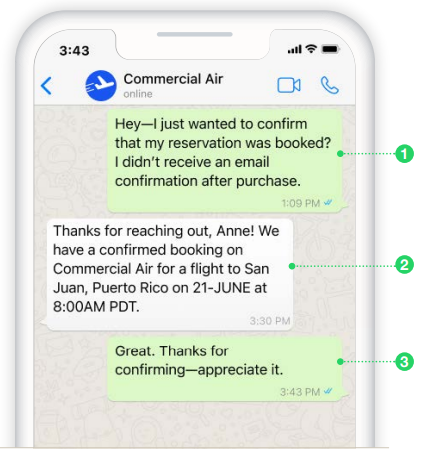
Scenario 2: Customer care or general support inquiries that require multiple 24-hour conversation sessions
1. Anne has a delivery that was supposed to arrive today. She doesn’t receive it and checks in with the company she purchased from, Uptown Cosmetics. When Uptown Cosmetics’ reply message is delivered, it starts a user-initiated conversation.
2. When the original 24-hour conversation session expires, Anne’s inquiry has not yet been resolved. After the initial conversation session expires, Uptown Cosmetics can continue a second conversation with Anne at the user-initiated rate as long as it has not been 24 hours since Anne’s last message.
In this scenario, Uptown Cosmetics pays for two userinitiated conversations.
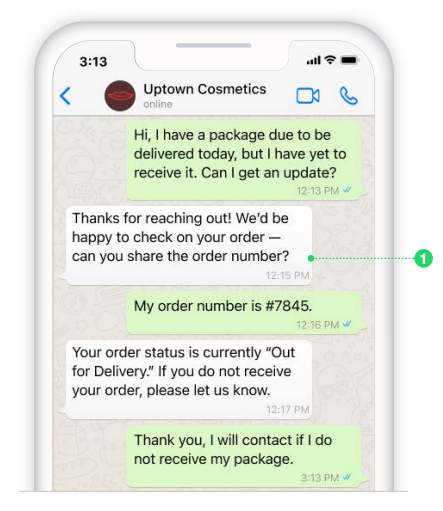
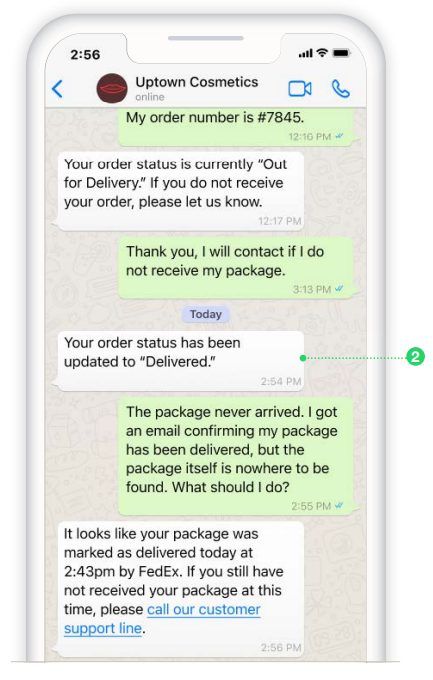
Scenario 3: User-initiated conversation leads to two conversations with a message template required
1.Anne wants to check on an order she placed with Uptown Cosmetics.
2. Uptown Cosmetics has a bot set up to reply to basic order inquiries, and responds to Anne with delivery details. This begins a user-initiated conversation.
3. As a follow up the next day, more than 24 hours since Anne’s last message, Uptown Cosmetics sends a message template to let Anne know that her order has been delivered. This begins a business-initiated conversation.
When the Uptown Cosmetics bot replies to Anne more than 24 hours after Anne’s last message, it results in a new, business-initiated conversation charge. Uptown Cosmetics also needs to use a message template as is standard when it’s been more than 24 hours since the last user message.
In this scenario, Uptown Cosmetics pays for one userinitiated and one business-initiated conversation
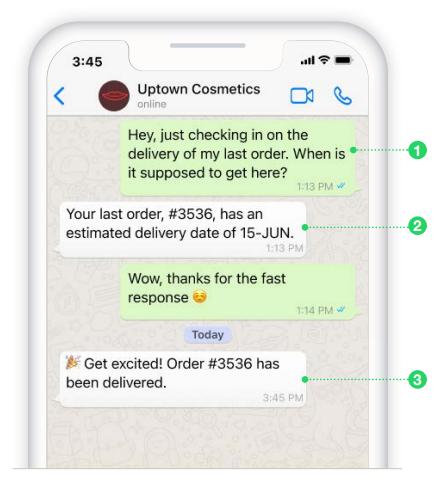
Business-initiated conversations
Scenario 4: Business initiates the delivery of a message template
1. When a flight is delayed or its status changes, Commercial Air alerts customers who have opted in to receive notifications using a message template. This starts a business-initiated conversation.
2. Commercial Air can send as many messages as needed during this single 24-hour conversation session and it will result in only one business-initiated conversation charge.
3. After that 24-hour conversation session expires, Commercial Air will incur another business-initiated conversation charge if they want to send Anne another update.
In this scenario, Commercial Air wants to let Anne know that her flight is delayed by 30 minutes.
Commercial Air will be charged for one business-initiated conversation for the delivery of these two message templates as they were both delivered to Anne within one 24-hour conversation session.
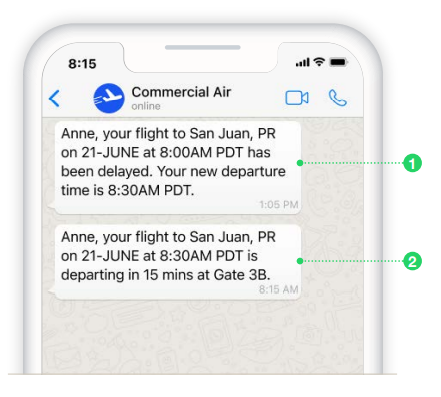
Scenario 5: Business-initiated with user reply leading to single conversation
1. When a customer places a new order from Uptown Cosmetics, the online retailer sends a text message to confirm the order has been received, and asks the customer if they’d like to receive notification when it ships. When this message is delivered, it begins a business-initiated conversation.
2. The customer selects Yes and opts into receiving additional order notifications.
In this scenario, Uptown Cosmetics pays for a single business-initiated conversation. If the user replies more than 24 hours after the initial business message delivery and that is followed by a business reply, that will result in a new, user-initiated conversation
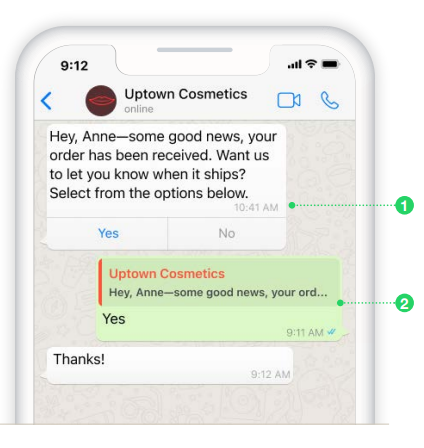
Questions and Answers
What is a conversation on WhatsApp?
Conversations on the WhatsApp Business API fall into two categories that are priced differently: user-initiated (think customer care and general support inquiries) and business initiated (think post purchase notifications). All conversations are measured in 24-hour increments or “sessions,” as we’ll refer to them here. These 24-hour conversation sessions start whenever the first message is delivered by a business, either in response to a user inquiry, or if a business-initiated message template is delivered.
When can a business send a free-form message?
A business can send free-form messages within 24 hours of the last user message in a conversation. If it’s been more than 24 hours since the last user message, a business must send a message template. Delivery of a message template opens a new conversation. Are all conversations paid? The first 1,000 conversations per month for each WhatsApp Business Account (WABA) are free. In addition, conversations will not be charged when a user messages a business using a call-to-action button on Ads that click to WhatsApp or a Facebook Page CTA. How are conversations charged? Charges for conversations are based on the end user’s phone number. Rates for business-initiated conversations and userinitiated conversations vary by market (country or region).
Are all conversations paid?
The first 1,000 conversations per month for each WhatsApp Business Account (WABA) are free. In addition, conversations will not be charged when a user messages a business using a call-to-action button on Ads that click to WhatsApp or a Facebook Page CTA.
How are conversations charged?
Charges for conversations are based on the end user’s phone number. Rates for business-initiated conversations and userinitiated conversations vary by market (country or region).
